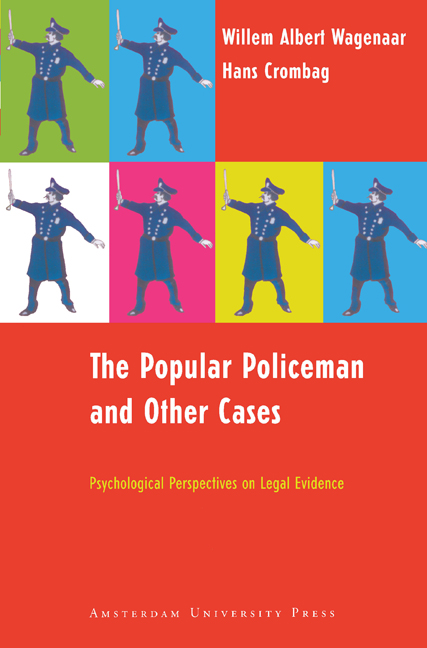Book contents
- Frontmatter
- Contents
- Foreword
- 1 Illegal Gambling or the Victory Travel Club
- 2 On Causal Reasoning or Death in the Warmoesstraat
- 3 Consumer Confusion or Potato Chips and Olive Oil
- 4 Fiction and Reality of ‘the Average Individual’ or the Case of Old Mr. Lane
- 5 Case Histories and Scientific Proof or the Case of JR
- 6 Not a Good Story or the Disappearance of Maddy and Vicky
- 7 Conflicting Scenarios or the Case of the Man who Needed a Companion
- 8 Two Processes Obstructing the Accuracy of Long-Term Memory or the Case of the Stolen Mercedes
- 9 Confessions after Repeated Interrogation or the Putten Murder Case
- 10 Collaborative Storytelling or the Artist’s Models and an Angry Neighbourhood
- 11 Allegation of Sexual Child Abuse in a Case of Disputed Visitation or Cindy's Story
- 12 Psychogenic Amnesia or the Case of the Amnesic Strangler
- 13 Obeying Reflexes or Death on the Climbing Wall
- 14 Visual Acuity or Shooting Mimi the Cat
- 15 Sexual Semiotics or the Case of the Popular Policeman
- Postscript: Psychological Expertise and the Law
- Bibliography
- Name Index
- Subject Index
9 - Confessions after Repeated Interrogation or the Putten Murder Case
Published online by Cambridge University Press: 16 February 2021
- Frontmatter
- Contents
- Foreword
- 1 Illegal Gambling or the Victory Travel Club
- 2 On Causal Reasoning or Death in the Warmoesstraat
- 3 Consumer Confusion or Potato Chips and Olive Oil
- 4 Fiction and Reality of ‘the Average Individual’ or the Case of Old Mr. Lane
- 5 Case Histories and Scientific Proof or the Case of JR
- 6 Not a Good Story or the Disappearance of Maddy and Vicky
- 7 Conflicting Scenarios or the Case of the Man who Needed a Companion
- 8 Two Processes Obstructing the Accuracy of Long-Term Memory or the Case of the Stolen Mercedes
- 9 Confessions after Repeated Interrogation or the Putten Murder Case
- 10 Collaborative Storytelling or the Artist’s Models and an Angry Neighbourhood
- 11 Allegation of Sexual Child Abuse in a Case of Disputed Visitation or Cindy's Story
- 12 Psychogenic Amnesia or the Case of the Amnesic Strangler
- 13 Obeying Reflexes or Death on the Climbing Wall
- 14 Visual Acuity or Shooting Mimi the Cat
- 15 Sexual Semiotics or the Case of the Popular Policeman
- Postscript: Psychological Expertise and the Law
- Bibliography
- Name Index
- Subject Index
Summary
Confessions are sometimes called ‘The Queen of Proof’, apparently on the assumption that no innocent person will confess to a crime he never committed. This assumption, although not unreasonable in many instances, is wrong as an absolute rule, more wrong than many people may realise.
There are a variety of reasons why people may falsely confess. Gudjonsson (1992) distinguishes three major categories: voluntary, coerced-compliant, and coerced- internalised false confessions. In the first category we find people with a morbid desire for notoriety, people with an unconscious need to expiate guilt about previous transgressions, people who make insufficient distinctions between fact and fantasy, and people who for some reason or other try to protect the real culprit. Coerced-compliant false confessions occur when suspects want to escape temporarily from the hardship of the interrogation or the custody. Usually, they harbour the hazardous belief that they can always retract their false confessions later on, and that in any case the truth will come out eventually. Meanwhile, they do not themselves believe in the veracity of their confessions.
In the third category, coerced-internalised false confessions, we find innocent confessors who have come to believe their own confessions, even though they often have no clear memory of committing the offence. This chapter deals especially with a subset of this third category, which we will label ‘Coerced-memory-based false confessions’. It concerns suspects who confess based on a false recollection of committing a crime. Our thesis is that some types of interrogations, in particular repeated interrogations, may illicit such false memories.
Autobiographical memory
Sincere false confessions in the category mentioned above are based on what one remembers of episodes in one's life. The question of how a false belief in being guilty of a serious crime may originate comes down to the question of whether a false memory of having performed some action can be implanted in someone's head. Not in just everybody's head; a mere one percent of the population would be enough to create a disturbing number of judicial errors. Empirical research about the malleability of autobiographical memory suggests a considerably higher proportion. In fact, there is no reason to believe that anyone would be exempt from such false beliefs, since the methods for implanting false memories are almost limitless. In chapter 8 we discussed misleading post-event information.
- Type
- Chapter
- Information
- The Popular Policeman and Other CasesPsychological Perspectives on Legal Evidence, pp. 143 - 160Publisher: Amsterdam University PressPrint publication year: 2012



